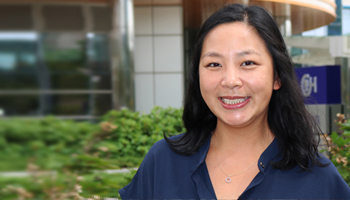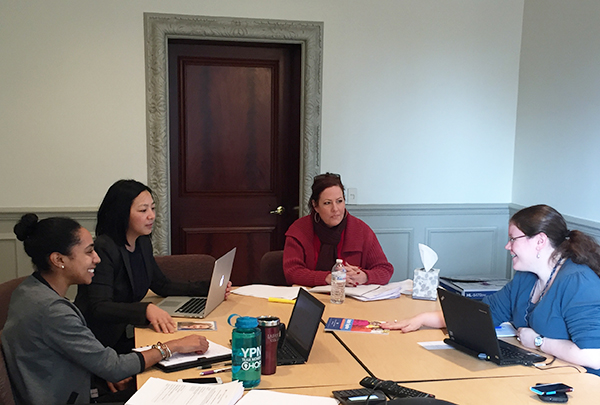HOW CAN WE HELP YOU? Call 1-800-TRY-CHOP
In This Section
Meet a Researcher's Best Resource: Q&A with Research Navigator, Katherine Yang-Iott
 If you’re a researcher, no matter how passionate you are for your work, you’ve most likely encountered a little logistic problem or two — whether it’s what to do with old lab equipment, how to import a drug you might need for a study, or who to go to when you have questions about onboarding new hires. These little details make the big discoveries possible. One year into her role as Research Navigator at Children’s Hospital of Philadelphia’s Research Institute, Katherine Yang-Iott has become the point person for those sorts of questions, a consultant who can objectively analyze any part of a research process (truly, any part!) to offer guidance and support. Last year, we looked at one week in Yang-Iott’s life as Research Navigator. This year, we go one step further: We step into a researcher’s shoes to learn some of the specific ways someone in her role can help.
If you’re a researcher, no matter how passionate you are for your work, you’ve most likely encountered a little logistic problem or two — whether it’s what to do with old lab equipment, how to import a drug you might need for a study, or who to go to when you have questions about onboarding new hires. These little details make the big discoveries possible. One year into her role as Research Navigator at Children’s Hospital of Philadelphia’s Research Institute, Katherine Yang-Iott has become the point person for those sorts of questions, a consultant who can objectively analyze any part of a research process (truly, any part!) to offer guidance and support. Last year, we looked at one week in Yang-Iott’s life as Research Navigator. This year, we go one step further: We step into a researcher’s shoes to learn some of the specific ways someone in her role can help.
First things first. Why is a Research Navigator necessary to the Research Institute?
Although I don't think support is necessary for success, it sure is way easier to become successful if you have a great support team. Research Navigation is here to be supportive. I want to learn how things work, why they might not be working for you, and to help create new solutions for our Institute. To me, everybody's role is important, and I want nothing else than to make it easier for people to do their jobs ... whether it's answering a quick question, connecting them to the right resources, helping them develop a new idea, or listening to their concerns about work.
Our Institute is so large that sometimes, when you’re trying to find an answer to something, you can get lost or you don’t know where to start. And because it’s so large, consistency isn’t always the case. My role helps to keep the answers consistent so that we identify the best way of doing something, the correct contacts for your questions to deliver the right answers. I'm in a unique position to look at issues from many points of views to make sure the messages don't get lost or misinterpreted.
What kinds of cases have you handled in the past year?
From February 2016 to February 2017, I’ve accumulated 358 cases (which include questions, ideas, and concerns) and a total number of 218 individual clients. These clients include investigators, administrators, study teams, and more from across the Institute and the Hospital. For most of those cases, a good 60 percent are people contacting me with a quick question: How do I do this, or who do I contact for that? In 25 percent of my cases, there are opportunities for process improvements that turn into bigger projects, which sometimes result in new programs or procedures.
Let’s get specific. Can you describe some of your projects that might help with my research?

Yes! ReCHOP is an enterprise-wide reuse, recycle, and repurpose program. Think of it as a Craigslist’s curb alert for CHOP. If you work in a lab and have equipment or lab supplies that are no longer in use, list it on ReCHOP. If you are a lab looking for supplies or equipment, you might find it on ReCHOP. And everything is free. Many departments across CHOP’s campus have excess furniture, office supplies, and medical supplies that can be donated to another team. I worked with the Recruitment Enhancement Core, Research Resources and Facilities, the Government Affairs and Community Relations team, and Environmental Services to create the program. Our goal was to create a centralized area for people to list items, claim items, and have a process in place to donate unclaimed items to our community partners. We hope the program will reduce the cost and space of storage, reduce the cost for waste and recycling, save teams money by reusing what we already have, and enhance CHOP’s relationships with local Philadelphia communities.
Besides that, one of my main goals is to connect people throughout the Institute. An example is the Core Tech Talks, a new seminar series that I helped organize with our Institutional Cores. Our institutional cores are technical teams that offer expert knowledge and services in key scientific areas with centralized equipment. Many people don’t realize how many cores we have or the types of services they provide. The goal of the Core Tech Talks is to highlight these core services and to have the core directors connect with the research communities they are serving. After all, our core directors are constantly thinking of ways to progress research and how to bring in new technology to help researchers, but they can have a hard time connecting with groups they’re not aware of. The series kicked off in January, and our next Tech Talk, which is on a driving simulator that can help study cognition, injury recovery, and more, is on March 21.
What about the more minute details of the research process, like, say, getting a drug for a trial? Can you give an example of how you could facilitate?
This year, I worked on a drug import process for a double-blind study. Importing a study drug involves many steps, and if you’ve never done it before, the task of figuring out the sequence of steps can be very daunting. Between all the paperwork, identifying the power of attorney, hiring brokers to facilitate the shipment through customs, using the right courier services, communicating with Investigational Drug Service (IDS), and working with the business managers to set up the wire transfers, it can be overwhelming for a study team. My goal in working with this one research team is to begin mapping out the drug import process and develop work flows and templates so the next team who has to do it won’t have to start from scratch.
What motivates you to keep doing this work?
I’m everyone’s advocate. I like that I have that connection with people. I’ve been here for more than 10 years, and I love learning about how our Institute works and runs. I’m all about trying different ways to resolve an issue; the optimist in me believes there has to be a way. I sometimes get the response that if I’ve been here long enough, I would know that others have already tried these ideas before and it didn’t work out the way they wanted. I like to encourage people who think that way to give me a chance, let me work with them to figure out why it didn’t work, and if we can do little things to make it work this time. My breakthrough moments are when I get emails from satisfied clients who sound both grateful and relieved that I was able to resolve a pressing issue for them …. that or when they tell me how they’ve been trying to do something unsuccessfully for many years, but I was actually able to deliver it to them. That feels pretty good.